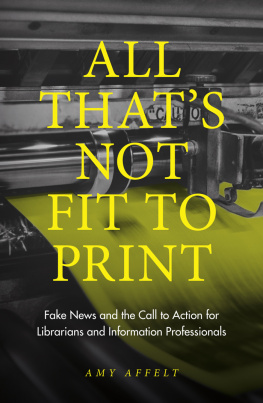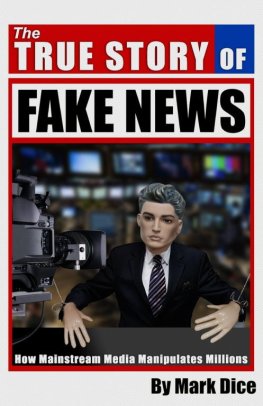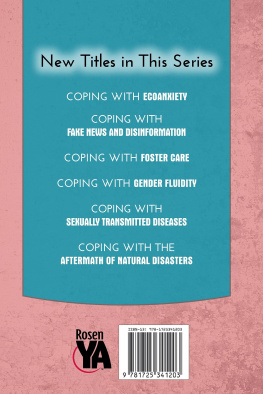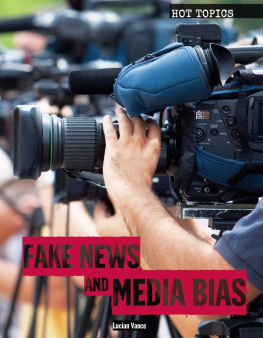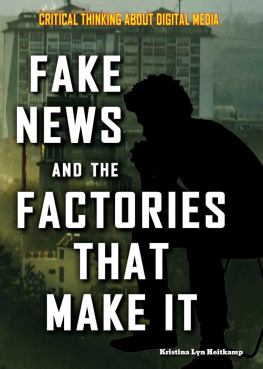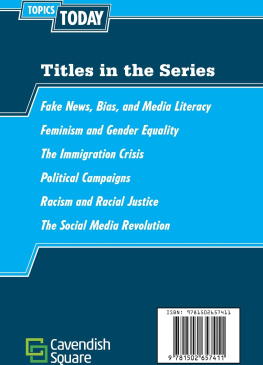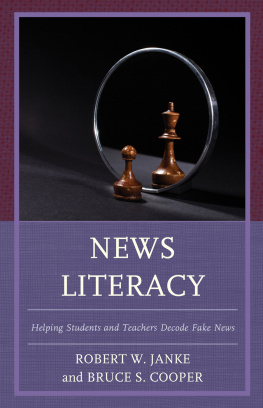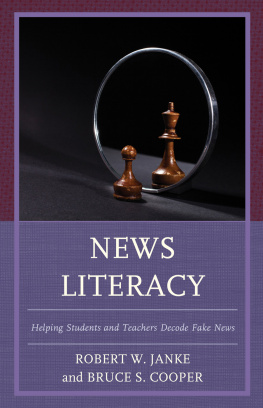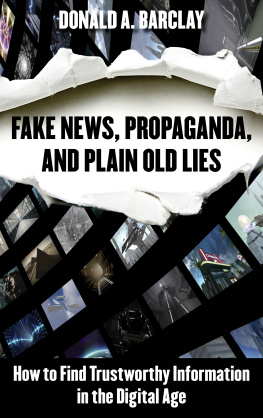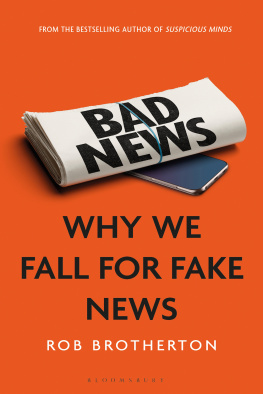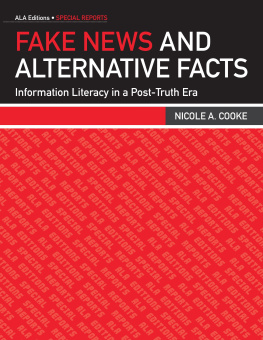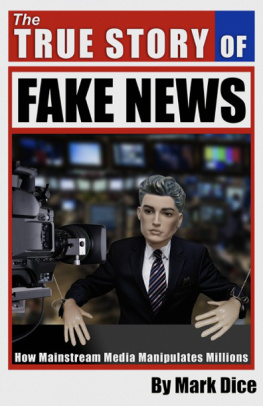Acknowledgments
Doris Helfer was the first mentor and colleague to approach me regarding the need to study the impact of fake news on librarianship. Since my initial presentation with Doris, many other colleagues have invited me to share my views as well as learn from theirs; thank you to John Bryans, Theresa Cramer, Jane Dysart, Kathleen Lehman, Marydee Ojala, and Sara Tompson.
Dr Toby Pearlstein is always incredibly generous with her time and expertise regarding all aspects of my work, and she was her usual supportive and encouraging self while I worked on this book.
I would also like to thank Margaret Pasulka Ritchey and Brigid Pasulka for their insight and guidance, and Brad Beeson for reasons known to him.
It is often said that the experience of being an only child is largely dependent upon who your parents are. Gerald Affelt and Carol Hughett Gugerty are the best parents anyone could ever hope to have, and I am beyond fortunate to be their one and only.
Finally, my husband, Michael G. Leslie, has taught me so much, in particular that the simple act of living can be such a joy. Thank you, Michael, for always believing that I can do so much more than I ever think possible.
Introduction
For as long as I can remember, news has played a central role in my life. Every day of my childhood, I woke up to WLPO, the local AM radio station that broadcasted all of the overnight happenings of our community of 10,000 residents, to which my father listened while he prepared for work. If it were a summer day, I would then walk a few blocks northeast to my Grandma and Grandpa Affelt's home, where WLPO's popular program, The Clearinghouse, would be on. A kind of early precursor to Craigslist, The Clearinghouse featured local residents phoning in and trying to sell everything from a set of snow tires to a litter of kittens to any interested neighbors. Next, I traveled across the alley to my Grandmother Hughett's home, where she could be found on her patio with the previous night's local newspaper, The News Tribune, checking out the latest adventures in the Brenda Starr comic strip, and working the crossword puzzle. At the end of each day, my mother would read to me from Chicago Tribune columnists Mike Royko and Ann Landers, even though Chicago seemed as far away as Mars to a young girl growing up amid the cornfields of central Illinois.
It never occurred to any of us in our family or community that the news that we consumed on a daily basis was anything but, as a character on a popular television program of the time espoused, just the facts, ma'am. We trusted the content in every story and report that we read. We believed the written word of the reporters and writers as if it were sacrosanct. Sure, there was occasional hyperbole, but it was easy to spot. Humor was relegated to sections labeled as such, and perhaps we were a bit nave, but critical judgment regarding source was not a consideration. We were pedestrian consumers of information; we weren't considering it in a professional context. Although I didn't know it at the time, that was the work of librarians.
Evaluating information integrity and quality has always been part and parcel to the mission of librarianship. On a basic level, the library itself is a repository of content and information, and none of it is fake news. Patrons should be confident that if they consume their news from the library, they are receiving accurate content. However, the library is not the primary source of news or information for American consumers. A 2017 Pew Research Center study found that 67% of Americans get at least some of their news from social media, and they are getting it from multiple outlets; Pew found that 26% of American adults get their news from two or more social media sites (Shearer & Gottfried, 2017). In this brave new world, the role of the librarian is more important than ever before, not because we are no longer the main conduits of news content for consumers, but in spite of it. If our patrons are getting their news from social media, Google search results, and shares from friends, they are definitely no longer looking to the library as the chief source of news content (if they ever did). Therefore, librarians need to be much more than providers of factual content. We need to help our requestors make critical choices regarding which news to consume. We need to ensure that they understand how to determine what is real and what is fake, and that process begins with our own training and continuing education regarding information veracity and quality and data sourcing and transparency.
Luckily, librarians are well poised to lead the fight against fake news, and indeed, we have already been tapped as the profession best able to determine the accuracy of information content. It was a proud librarian moment for me when Christiane Amanpour, CNN's chief international correspondent, used a graphic from the International Federation of Library Associations and Institutions (IFLA) in a segment on spotting fake news in February 2017 (IFLA Website, 2017). The IFLA infographic offers numerous red flags to look for when determining veracity of news, and Amanpour's endorsement lent credibility not only to IFLA's checklist but also to IFLA itself and its member librarians as guides through the landmines of misinformation. Indeed, the final admonishment in the list is Ask an Expert, with a subtitle of Ask a Librarian. If there were any doubt that this should be our mission, an endorsement from Christiane Amanpour should be all that we need in order to reinforce a role that we always knew that we had. However, even if we have worked in information literacy before, others may have been unaware of our specialized training in this area, so it is critically important that we market our skills and abilities in order to be seen as the go-to professionals for finding relevant information and data from high-quality sources. It may not seem like a new role to us, but it may be seen that way to others, so in that case, it is, in a way, a new role for librarians to assume. We also need to become and remain first and foremost in the minds of the decision-makers at the organizations in which we work, whether they are senior executives at corporations, partners at law firms, deans at universities, or boards of directors of public libraries.
Marketing is always tricky, and marketing ourselves as truth-tellers in an era of quick information that is accessed outside of our presence can seem daunting. However, the good news is that we already have the skills; we just need the promotional tools and self-confidence to make them known. Most of us took information literacy courses in library school and we practice their tenets on a daily basis. Determining which data and content are needed, finding that information from the most credible source, and accessing it, analyzing it, and packaging it in a way that resonates most clearly with our stakeholders are among the most basic activities of a reference librarian. We just need to be able to market the services that we currently provide within the landscape of a world of alternative facts and fake news. Our requestors are probably aware that we undertake these activities, but they might not make the connection that their importance takes on a new urgency in the current climate. Not sure how to get started? Think of the tagline, Is This Real News? Only Librarians Know for Sure.
When we serve as purveyors of truth and position ourselves as the professionals best able to help others navigate fake news, we also expand our skill sets and open ourselves up to new career options. Not only do we practice the skills explained above and lead by example when working on reference projects, but also we are able to teach information literacy and best practices for evaluating information to others. Further, we are expert at judging the quality of the information retrieval systems themselves. While we have always worked with proprietary databases and have always understood which types of indexing and metadata form the components of a robust, effective search engine that returns relevant results, it is likely that others in our organizations do not have this same expertise.

